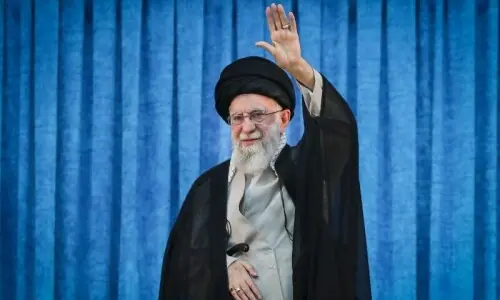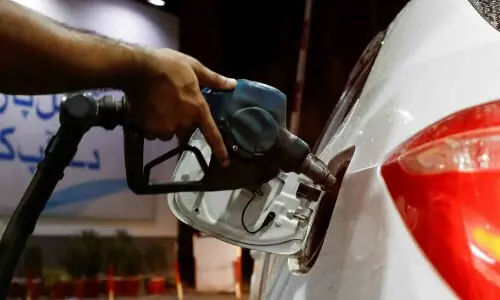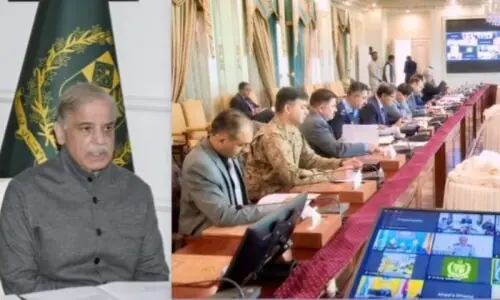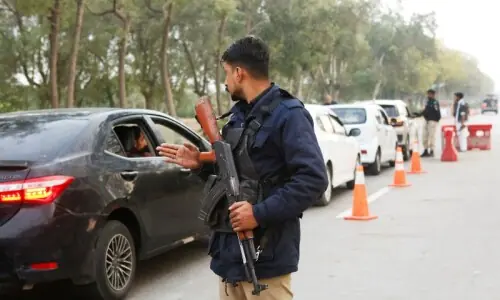Threat to quit Safta
THERE are some troubling indications that Islamabad may be contemplating pulling out of the South Asia Free Trade Area (Safta). That would be very unfortunate from Pakistan’s perspective. It would do little damage to India, but it would be a highly imprudent use of economic policy in an area in which Pakistan has little leverage.
While most countries that are members of the South Asian Association for Regional Cooperation (Saarc), have ratified the Safta treaty, Pakistan is reluctant to follow, arguing that ratification would involve granting the “most favoured nation” (MFN) status to India. This, as I will argue in this article, is a wrong approach. Neither pulling out of Safta nor continuing to deny India the MFN status would help Islamabad achieve the objectives it seeks. Let me first deal with the MFN issue.
According to the rules of the World Trade Organization (WTO) and obligation of membership in that organization, all member states must give the MFN status to each other. The failure to comply can lead to a complaint by a state that has not been given the status by another member. In response to a reference by the aggrieved party, the WTO can impose sanctions on the offending member.
The principle of the MFN — that the same treatment has to be granted to all members of the organization and that no member can be discriminated against — is one of the pillars on which the WTO was built and on which it stands. The WTO came into being in 1995 following the conclusion of the Uruguay round of negotiations and the signing of the Marrakesh treaty. Both India and Pakistan were original signatories. Pakistan, in other words, is obliged to give the MFN status to India as it has given it to all other countries that are WTO members.
India, observing the rules of membership, gave the MFN status to all the countries it traded with; Pakistan refused to reciprocate and kept India out of its list. Several arguments have been put forward since that decision was taken as to why Pakistan was not ready to comply. Some of them are political and some economic. It is said that the term “most favoured nation” does not translate well into Urdu and that the grant of the status to India by Pakistan would lead to headlines in the Urdu press that would not be comfortable for Islamabad. The headlines would proclaim that Pakistan has declared India to be its most pasandeeda mulk, a description that would not sit well with some anti-India elements in the society.
Some years ago, Washington had the same problem with reference to China. Since China at that time was not a member of the WTO, the grant of the MFN status to it from the United States could only be done by legislative action. The US Congress had to pass a bill every year to authorize the grant of the MFN status to China. Every time it was done, China-bashers in America accused the administration in Washington of insensitivity to China’s alleged abysmal record in areas such as human rights, environmental protection, treatment of minorities, etc. The MFN question, in other words, became an important lever in the hands of Washington in conducting its relations with Beijing.
Washington handled this recurrent problem by dropping the “most favoured nation” term from its legislative lexicon altogether. The term was replaced with the less emotive “normal trading relations” and the strategy worked. Pakistan could perhaps take a leaf out of Washington’s diplomatic playbook and designate its relations as being “normal” with India rather than be subject to conditions and barriers that do not have the sanction of the WTO.
Besides, as matters now stand, trade with Pakistan is of little consequence for India. Pakistan does not have any leverage over India in terms of the markets that India covets or the markets in India that would be starved if Pakistan blocked the supply of its goods to them. Trade is a poor and ineffective leverage to use for Pakistan in its relations with India. That is also not the case with India, which is the reason why the two countries do so little trade.
Politics is not the only reason why Pakistan continues to stall the normalization of trade relations with India so that they meet the obligation of membership in the WTO. Islamabad claims — and in this respect it has a fair amount of evidence on its side — that even after granting Pakistan the MFN status, India has continued to discriminate against its neighbour by putting in place all kinds of non-tariff barriers. These cover a wide front. Merchandise entering India from Pakistan has to meet certain standards which are prescribed by Indian laboratories, and these are located at some considerable distance from the Pakistani border. Pakistani exporters have to incur fairly large expense to meet these requirements. This condition serves as a quasi tax on imports from Pakistan.
Another popular form of non-tariff barrier is the category of sanitary and phyto-sanitary (SPS) regulations that pertain to agricultural products. The SPS is a common non-tariff barrier used by most countries that wish to protect their agriculture sector. India is no different in that respect and it has applied this type of trade restricting measure in its trade with all neighbours. Both Bangladesh and Nepal are very resentful of the way New Delhi has been using SPS to constrain imports from these two countries, particularly of perishable commodities.
India has also become an enthusiastic user of anti-dumping measures to limit imports. These measures are allowed under the WTO; the problem with them is that they impose great administrative burden and expense on the countries that are subjected to them. The main problem with the way anti-dumping provisions work is that the burden of providing proof that the sanction applied is wrongly used rests on the shoulders of the country against which they are being used. It is not surprising that large countries that have the bureaucratic and legal infrastructure to sustain anti-dumping remedies are its most frequent users. The countries that are adversely affected are those that do not have the administrative, legal and financial means to challenge these activities.
And India has also used the grant of transit rights as a way of throwing its weight around in trade matters in the region in which it is an economic and military colossus. It plays with transit rights if it wishes to discourage the export of some goods that would gain market share in third countries on the part of some of its small neighbours. India has been known to direct the Nepalese traders to use the ports most distant from the places where goods are manufactured. It is also not willing to grant Nepal access by road for some of its products that have a market in Pakistan. It is much cheaper for the Nepalese and Pakistani traders to use road for trade rather than go through a combination of road and ocean transport. In other words, India has successfully used its control over transit routes in intra-regional trade to achieve its narrow economic objectives.
However, by holding back on MFN status Pakistan has not been able to strengthen its position with respect to India. It has not acquired a weapon whose use would prompt the right economic behaviour from India. The same applies to membership in Saarc and ultimately in Safta. By threatening to quit Safta, Pakistan, instead of weakening the Indian hand, would only strengthen it. This is particularly the case if Pakistan wishes to produce forward movement on India’s part in resolving the long-festering problem of Kashmir. Safta should not — and must not — be used as a lever by Islamabad over Kashmir.
One of the long-term Indian goals has been to isolate Pakistan in the region that encompasses both countries as well as in the region in which Pakistan has a more significant presence than India. Ever since the idea of a regional cooperation mechanism was floated by Bangladesh, which eventually led to the creation of Saarc, India has been reluctant to give much authority to the organization. Delhi has deliberately kept the Saarc secretariat, located in Kathmandu, weak. The secretariat cannot undertake any independent work unless it has the sanction of the capitals of the entire membership. This is one way of giving India a veto over all actions by the secretariat.
Delhi is the most difficult capital to please for the Saarc bureaucracy; it has even blocked the flow of grants from institutions such as the World Bank, the Asian Development Bank, and the British Department for International Development to allow the secretariat to do independent analytical work. One reason why the Saarc has remained weak is that India wishes it to be that way.
While participating in Safta, Delhi is simultaneously — but more aggressively — promoting another regional grouping, the BIMSTEC. This organization has all countries of the Saarc minus the Maldives and Pakistan as its members. In addition, it includes Myanmar and Thailand. The BIMSTEC is following a more aggressive timeline than Safta. If it is established before Safta the latter would become largely meaningless.
Indian trade diplomacy is engaged in other ways to isolate Pakistan. It has so far been successful in keeping Pakistan from associating with the Asean. India also managed to exclude Pakistan from the recently established forum of large Asian and African countries that has the ambition to create a large trans-continental free trade area.
With this as the background, it is mind-boggling why Pakistan would contemplate walking out of Safta. Such a step would not get India to move on Kashmir — the ostensible reason for such a move. It would only further isolate Pakistan in the South Asian region at a time when India is gaining more strength every day. Instead of leaving Safta, Pakistan should work hard to strengthen the organization.
In that context, it is useful if the Pakistani authorities spent some time studying the experience of other successful regional trading organizations, in particular those which had one relatively large economy in the centre surrounded by smaller ones. The European Union is a classic case of an economic and trade organization that was able to constrain the region’s largest economy, Germany, and force it to play by rules that were acceptable to all member states. The same is true for Mercosur in which Brazil, the organization’s largest economy and the region’s most powerful country, has been bound to good political economic behaviour by a system of rules. The small countries in southern Africa are working hard to create a similar organization in which South Africa will be embedded.
If India works at times to the disadvantage of its neighbours by using non-tariff barriers to constrain trade, or harasses them by anti-dumping measures, or uses transition restriction to achieve narrow national interests, an organization such as Safta would be an ideal forum within which to correct such errant behaviour.
Pakistan is South Asia’s second largest economy and it is incumbent upon it to play a role that would encourage all member countries to work for the common good rather than promote narrow national interests. Quitting Safta and not playing that role would be a mindless policy to follow.
Criminals who got away
THE West blames the East, the East blames circumstances. Meanwhile, Europe’s two most-wanted men — indicted Bosnian Serb war criminals Radovan Karadzic and Ratko Mladic — have for the last 10 years freely roamed impoverished Bosnia-Herzegovina and Serbia-Montenegro with US bounties of $5 million on their heads.
In the minds of some of their die-hard supporters, these outlaws of the 1992-1995 Bosnian war have become romantic, almost glamorous, villains — the Butch Cassidy and Sundance Kid, if you will, of the Balkans.
Why haven’t they been arrested? After a decade of lame excuses, Nato recently came up with a truly novel explanation. Maj. Gen. David Leakey announced that the fugitives were “very unlikely to be arrested soon” because coordinated international action had made it “virtually impossible for them to move around freely.” In other words, the Nato posse had been so effective at scaring them and encircling them as to preclude the possibility of nabbing them. Clever, huh?
It’s generally assumed that Mladic, indicted in the 1995 slaughter of thousands of Muslim men and boys in Srebrenica and other war crimes, is holed up somewhere in Serbia, where he could, presumably, be caught if authorities had the will and the skill.
Western intelligence agencies have regularly placed Karadzic, the former Bosnian Serb president held responsible for the ethnic cleansing of Bosnia, beyond Belgrade’s reach, possibly somewhere in the borderlands between Bosnia and Montenegro, a region of rugged mountains and secluded valleys where anti-communist World War II fugitives holed up for as much as a decade after Europe was liberated. But this area too is well within the reach, if not the grasp, of Nato’s well-equipped, trained and mobile forces stationed in Bosnia.
Still, it doesn’t appear they’re going to be found very soon. After years of sitting on its hands, NATO, whose forces in Bosnia are now down to 7,000, has conveniently decided that it is not responsible for capturing the two men - that it will take a Serb to catch a Serb.
And is that likely? As a result of wounded national pride, one can still find T-shirts, calendars, posters, lapel pins and wooden icons emblazoned with the faces of Karadzic and Mladic. Adept apologists themselves, the Serbs have matched NATO’s failure to arrest the famous outlaws, pathetic excuse for pathetic excuse. No one believes them, of course, but still nothing gets done.
It didn’t have to be this way. Ten years ago, when the International Criminal Tribunal in The Hague indicted Karadzic and Mladic on charges of genocide and crimes against humanity, NATO had 60,000 troops in Bosnia, which is smaller than West Virginia. For two years after the indictments, Mladic and Karadzic moved freely across Bosnia in full view of NATO forces, according to Carla Del Ponte, The Hague war crimes prosecutor.
“Karadzic was giving interviews and running party and state business with the full knowledge of the international community, while Mladic even participated in military ceremonies,” Del Ponte told the UN Security Council last month. In failing to arrest them, Nato put the safety of its troops above its obligation to arrest war criminals.
And now Serbia - a small nation broken by civil wars and international sanctions, demoralized by the U.S.-led NATO bombing of 1999, rich only in lost causes - stands to lose millions of dollars in US aid if it does not deliver the two men to the tribunal in The Hague. But by opting to strong-arm a small nation, the West has engendered grass-roots hostility.
The victims of sanctions will be the majority of Serbian citizens who are trying to rebuild their country, not the small number of die-hards who are protecting the outlaws. Serbia has already handed over two former presidents (notably Slobodan Milosevic), three generals, two chiefs of staff, one secretary of defence and scores of lesser-known indicted war criminals, in addition to two top spymasters. It has a democratic government led by men and women who defeated Milosevic twice in 2000, first at the polls and then in the streets when he tried to steal the election.
But the government hasn’t done everything it could. Mladic’s son was even permitted to collect his father’s army pension up until last month. The Serbian government has yet to freeze the fugitive’s assets.
It is sad that this region still fosters a culture of impunity, that it continues to ignore the air of coldblooded indifference shown by those who have been caught in the act.—Dawn/Los Angeles Times
The writer is the editor of the Politika daily newspaper in Belgrade.
A general’s dishonour
He has also added to his dishonour as a commander who oversaw improper interrogations at Guantanamo Bay, then introduced some of the same practices in Iraq in violation of the Geneva Conventions. Gen. Miller’s subsequent account of his actions, in sworn testimony to Congress and Army investigators, has been contradicted by at least four other witnesses, so it’s not surprising that he has sought shelter in the military’s equivalent of the Fifth Amendment.
He has yet to be the subject of any charge. But anyone who still accepts the Abu Ghraib cover story peddled by the White House and the Pentagon — that the abuses portrayed in now-infamous photographs were invented by rogue guards on the night shift — ought to be asking what this two-star general is afraid of.
Gen. Miller was commander at Guantanamo in 2002 when prisoners were subjected to abuses documented by shocked FBI agents as well as the International Red Cross, which called them “tantamount to torture.” An Army investigation completed last summer found that an Al Qaeda suspect named Mohamed Qahtani was threatened with snarling dogs, forced to wear underwear on his head and led by a leash attached to his chains — the very abuse later shown in the Abu Ghraib photographs.
In August 2003 Gen. Miller was dispatched to Iraq with the mission of improving intelligence collection from detainees. Within weeks dogs had been introduced to interrogations at Abu Ghraib.
—The Washington Post
When will EU denuclearize?
THERE is no nuclear bomb on Iranian soil. Even the worst foes of the Islamic Republic agree that Iran does not have a bomb. According to a rather optimistic projection of the American intelligence agency, CIA, the country is about 10 years away from making the weapons.
However, the bomb which is nowhere in sight in Iran is causing tremors in the corridors of power in Europe and North America. The US and EU-3 (Great Britain, France and Germany), in particular, seem to be determined to contain Tehran’s atomic ambition and save the world from the non-existent Iranian weapons of mass destruction. But what about the nuclear weapons which are there on the territories of the European countries? These are the American, British and French bombs which have already been manufactured, which are ready for use and which pose grave threats to Europe and the rest of the world.
It is, indeed, interesting to note that the US, the sole superpower which is in the forefront of the campaign against Iran’s atomic programme, deployed its own nuclear weapons in Europe way back in September 1954, when it delivered gravity bombs to its bases in Britain. “During the next decade,” observe Robert Norris and Hans Kriestensen in their report published in the November/December 2004 issue of the Bulletin of Atomic Scientists, “weapons went to Germany, Italy, France, Turkey, Netherlands, Greece and Belgium.” In 1971, the number of US nuclear warheads based in Europe peaked at approximately 7,300.
One may argue that the placement of the bombs on European territories was a Cold War imperative and the US has already withdrawn most of its weapons from there. However, even more than a decade after the dissolution of the Soviet union and end of the Cold War, the United States still has 480 nuclear bombs deployed in Europe.
Worse still, the US is opposed to any suggestion for the withdrawal of its nuclear weapons from Europe. Such is the state of affairs even when the demand for the removal of these weapons is growing in Belgium, Germany, Norway and elsewhere in Europe. On March 22, 2005, for instance, the Belgian senate foreign affairs committee adopted a resolution calling for the removal of US nuclear weapons from Belgium and Europe. A month later, on April 21, a resolution was approved unanimously by the full senate.
Around the same time, on May 2, 2005, the German magazine Der Spiegel published a public opinion poll that showed overwhelming support (76 per cent) for removing the weapons. Likewise, a number of European political parties and leaders have also called for the removal of the American nuclear weapons from Europe. But the weapons remain there and the US continues to resist all demands for their withdrawal.
These 480 nuclear warheads are not the only nuclear weapons on the territories of the European states. In addition, there are the British and French atomic bombs — bombs which should be more deadly than the one which Iran has not manufactured as yet, although the latter is technologically incapable of doing so in the near future.
The French nuclear arsenal with 482 strategic nuclear weapons is the third largest in the world. Of course, the country has undertaken sweeping reduction of its weapons, it is reportedly also engaged in modernizing its sea-bed nuclear force, with the first of a new SSBN class, the Le Triomphant, along with a new SLBM, the M-45.
Great Britain, like France, has also considerably reduced its nuclear arsenal. However, its nuclear stockpile, according to 2002 estimate of the Natural Resources Defence Council, is about 200 of one type — much less than what it had in mid-1970s when the stockpile had peaked at some 350 warheads.
All these nuclear weapons — American, British and French — are deadly, are on European Union territories and need to be destroyed as other nuclear weapons manufactured by other countries.
But it is clear that the US and EU-3 are after the Iranian bomb. It seems as if they have certain other compelling reasons for targeting Iran. This impression is further strengthened when noted that Iran has put forward a fairly strong case in its defence. It has, in fact, reiterated again and again that its programme is for peaceful purposes only; it is a signatory to the Non-Proliferation Treaty (NPT); it is a member of the International Atomic energy Agency (IAEA); its nuclear activities are constantly monitored by the agency; and when IAEA expressed its reservations regarding its nuclear research programme, Iran voluntarily allowed the agency to put seals on its nuclear research facilities.
By and large, Iran has enjoyed good relations with the IAEA and as pointed out by its supreme national security secretary, Ali Larijani, “the country has allowed 1400 man-hours of inspection of its nuclear sites.” According to a report, the Iranian President Mahmoud Ahmadinejad categorically refuted the charge that Iran was making the bomb. He said: “We are a civilized and ancient nation, and a nation that has culture and logic does not need nuclear weapons.” Maintaining that such weapons are sought by people who intend to solve everything through brute force and bullying, he added: “Unfortunately, today people face rulers who think they have more rights than other nations because their arsenals are stocked with nuclear, biological, and chemical weapons.”
However, the nuclear stand-off between Iran and the West continues. Indeed, ever since a group of Iranian exiles, the National Council of Resistance of Iran (NCRI), revealed in August 2002 that Iran was hiding a uranium enrichment plant at Natanz and other nuclear sites, Iran has come under increasingly pressure from the US and the EU-3. Claiming that it is an independent, sovereign state, that it is opposed to nuclear colonialism and has a right to atomic research, Iran has resisted all such pressures and accused the West of double standards. This has resulted in worsened ties with the US and certain European states.
The situation deteriorated further when the IAEA board of governors adopted a resolution on Iran’s atomic programme in its meeting held in September 2005. Drafted by Britain, France and Germany, the resolution called on Iran to halt its enrichment programme and warned that the matter could be referred to the UN Security Council if Iran failed to heed the call. However, the issue was not immediately referred to the Security Council and it was hoped that diplomacy would somehow resolve the issue.
But this was not to be and the hurling of accusations and counter-accusations have further marred the prospects for an understanding over the nuclear issue. There is a strong possibility that the matter may be taken up by an extraordinary meeting of the IAEA board of governors and that eventually the UN Security Council would be approached for the imposition of sanctions on Iran. Tehran resents such moves and threatens the withdrawal of its cooperation with IAEA if the Security Council is approached.
Given the state of affairs, Iran-bashing will not deliver the goods. The nuclear standoff may, in fact, further whip up nuclear nationalism in revolutionary Iran and any intervention from outside may ultimately cause grave regional and global insecurities.
It is, therefore, important that the European Union concentrate on the substantive issue and strive for the banishment of all nuclear weapons in every continent. It could earn credibility if it launches a vigorous campaign for the withdrawal of American nuclear weapons from Europe and for the total destruction of British and French nuclear warheads. The EU would then be on a very high political, military and moral grounds and in a position to ask other states to give up their nuclear ambitions.




























